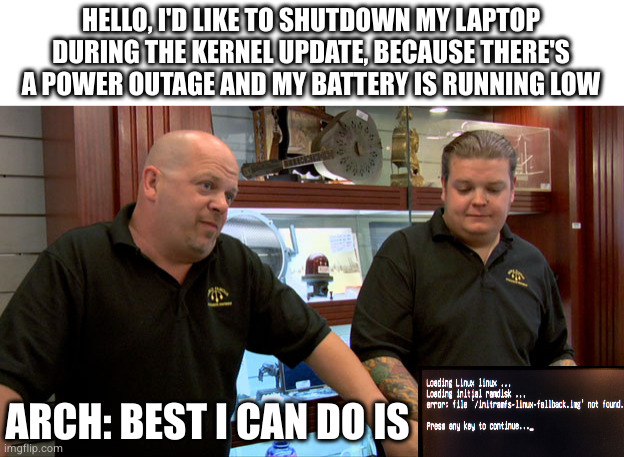Ive been here. U can use a bootable usb to boot. Then use switch root to change to ur actual filesystem (I'm glossing over a lot of complications here ask chatgpt) and update from here or just copy over the kernal.
linuxmemes
Hint: :q!
Sister communities:
- LemmyMemes: Memes
- LemmyShitpost: Anything and everything goes.
- RISA: Star Trek memes and shitposts
Community rules (click to expand)
1. Follow the site-wide rules
- Instance-wide TOS: https://legal.lemmy.world/tos/
- Lemmy code of conduct: https://join-lemmy.org/docs/code_of_conduct.html
2. Be civil
- Understand the difference between a joke and an insult.
- Do not harrass or attack members of the community for any reason.
- Leave remarks of "peasantry" to the PCMR community. If you dislike an OS/service/application, attack the thing you dislike, not the individuals who use it. Some people may not have a choice.
- Bigotry will not be tolerated.
- These rules are somewhat loosened when the subject is a public figure. Still, do not attack their person or incite harrassment.
3. Post Linux-related content
- Including Unix and BSD.
- Non-Linux content is acceptable as long as it makes a reference to Linux. For example, the poorly made mockery of
sudoin Windows. - No porn. Even if you watch it on a Linux machine.
4. No recent reposts
- Everybody uses Arch btw, can't quit Vim, and wants to interject for a moment. You can stop now.
Please report posts and comments that break these rules!
Important: never execute code or follow advice that you don't understand or can't verify, especially here. The word of the day is credibility. This is a meme community -- even the most helpful comments might just be shitposts that can damage your system. Be aware, be smart, don't fork-bomb your computer.
When I used Arch I updated once and it removed the running kernel and its modules. So when I plugged in a webcam it didn't work, since the module was gone.
Not a catastrophe, but it was an off-putting user experience coming from Debian. Arch felt more like a desktop OS, Debian feels more like a server OS to me (updates generally warn/confirm when you need to restart services or the machine).
To each their own! Having more up to date stuff was a nice perk of running Arch, certainly.
I have LTS and zen kernels installed in addition to the default Arch one, that should prevent this yes?
I'm not sure - I had zen and the default kernel and both were inaccessible
If you're planning for this type of failure, what you probably want instead is Aurora from the Universal Blue project. Since it's fedora silverblue underneath, your OS either updates all at once or doesn't.
This got me looking to see if there is any way to have a fallback as I have had something similar happen to me.
The general advice is to have a liveboot USB around. I even saw that you can have GRUB simply boot from an .iso file on the internal drives, which eliminates the need to keep a USB stick around.
I haven't followed the steps yet but I'll give this a shot because it intrigues me.
https://www.linuxbabe.com/desktop-linux/boot-from-iso-files-using-grub2-boot-loader
I always have a separate huge kernel on hand that boots without an initrd.
Or you could just install NixOS for update rollbacks (or use zfs/btrfs and set an alias to take snapshots whenever you update)
